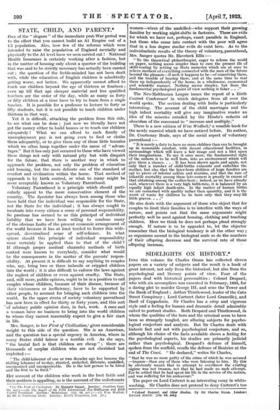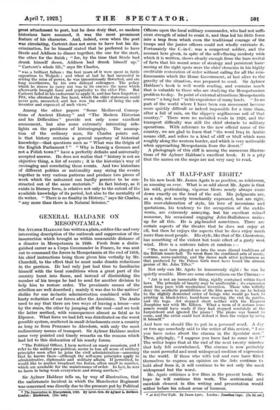SIDELIGHTS ON HISTORY.*
INTO this volume Sir Charles Oman has collected eleven papers on a variety of subjects and the result is a book of great interest, not only from the historical, but also from the psychological and literary points of view. Four of the papers deal with historical personalities : Colonel Despard, who with six accomplices was executed in February, 1803, for a daring plot to murder George III. and seize the Tower and the Bank of England ; Arthur Thistlewood, leader of the Cato Street Conspiracy ; Lord Carteret (later Lord Granville), and Basil of Cappadocia. Sir Charles has a crisp and vigorous style and a feeling for human and dramatic detail admirably suited to portrait studies. Both Despard and Thistlewood, in whom the qualities of the hero and the criminal seem to have
been so strangely tangled, are alluring subjects for psycho- logical conjecture and analysis. But Sir Charles deals with historic fact and not with psychological conjecture, and so, although his choice of the facts available shows a feeling for the psychological aspects, his studies are primarily judicial rather than psychological. Despard's defence of himself, spoken from the scaffold, recalls the defence of Beatrice at the end of The Cenci. "He declared," writes Sir Charles, "that he was no more guilty of the crime of which he was accused —treason—than any of those who were listening to him. By this he obviously meant that to attempt to overthrow the existing regime was not treason, not that he had made no such attempt. For he added that he had spent his life in the service of the nation, and was suffering for his endeavour."
The paper on Lord Carteret is an interesting essay in white- washing. Sir Charles does not pretend to deny Carteret's too
• Colonel Despard, and Other EWA% BY Elk Charles Qinan• .10,09118 - Edward Arnold. [108. ed. net.]
West attachment to port, but he does duly that, as modern historians have assumed, it was the most prominent feature of his character. And, indeed, even when the port was circulating, Carteret does not seem to have lost his dis- crimination, for he himself stated that he preferred to have Steele and Addison to dinner together, the one for the start, the other for the finish ; "for, by the time that Steele had drunk himself down, Addison had drunk himself up." " Carteret's whole life," says Sir Charles,
"was a brilliant failure : the best years of it were spent in futile opposition to Walpole ; and when at last he had succeeded in seizing the reins of power, he was ignominiously thwarted, and ere long overthrown, by his own disloyal colleagues. The policy which he strove to carry out was in its essence the same which afterwards brought fame and popularity to the elder Pitt. But Carteret failed in his endeavour to apply it, and has been forgotten : Pitt, who obtained the free hand, which the elder statesman could never gain, succeeded, and has won the credit of being the sole inventor and exponent of such views."
Among the other papers "Some Mediaeval Concep- tions of Ancient History" and "The Modern Historian and his Difficulties" provide not only some excellent
amusement, but also some extremely interesting side- lights on the problems of historiography. The assump- tion of the ordinary man, Sir Charles points out, is that history contains a general repertory of historical knowledge—that questions such as "What was the Origin of the English Parliament ? " "Why is Danzig a German and not a Polish town?" have a perfectly definite and universally accepted answer. He does not realize that "history is not an objective thing, a list of events ; it is the historian's way of
envisaging and correlating these events. And two historians of different politics or nationality may string the events together in very various patterns and produce two pieces of work which the unlearned can hardly perceive to be con- structed out of the same Materials." In fact history, as it exists in literary form, is relative not only to the extent of the
available knowledge of its period, but also to the mentality of its writer. "There is no finality in History," says Sir Charles, "any more than there is in Natural Science."











































 Previous page
Previous page